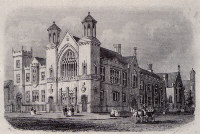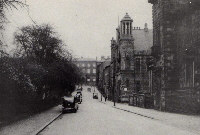What were, perhaps, the handsomest group of buildings stood at the corner of Winckley Square and Cross Street. Hardwick, in his 'History of the Borough of Preston', written in 1857, refers to them as "one of the chief architectural ornaments of the town". They were the Winckley Club, on the eastern side of the Square, the Literary and Philosophical Institution which adjoined the Club and stood on the corner of Cross Street, extending into that street and, beyond that, the Grammar School. At the southern corner of Cross Street stood another very beautiful building, the Italian-style villa of William Ainsworth. All of these buildings have been demolished and replaced by modern buildings.
 |
An engraving of the Winckley Club (on the left) and The Literary and Philosophical Institution. |
The Shareholders alone were to have the management of the Club and alone be entitled to the profits and bear the losses arising therefrom. Eventually, there were a hundred shares owned by eighty-two shareholders. Annual Subscribers were also admitted and 'Country' Subscribers at half the rate of ordinary ones.
The Newsroom was a very important feature of the Club and at every Annual General Meeting, from the very first one, there was an auction of Newspapers and Periodicals for the ensuing year. This meant that the highest bidder could purchase every issue of a newspaper or periodical for the coming year after it had been made available to the Club members in the Newsroom for a stipulated time. It was then delivered to the purchaser and became his property. Some papers, however, were filed and kept by the Club.
The Newsroom was to be open every day in the week from eight o'clock in the morning until eleven o'clock in the evening, though the first Club Keeper, William Ward "having inquired at what Hour the Newsroom should be closed on a Sunday evening the Committee Informed him that no objection would be made to closing it on that day at ten o'clock If no member of the Club should then be present". (Committee Meeting, 16th May, 1846).
The Billiard Room was to be open "every day in the week (except Sundays) during the same hours and until any game which may be in play at eleven o'clock be finished". For its members, exclusively Gentlemen, which included the wealthy cotton and other manufacturers, professional men, clergymen and officers of the military from Fulwood Barracks, the Club was a very comfortable place; for its servants, an exacting one.
The first Club Keeper, William Ward, was given the weekly wage of 18 shillings and allowed 10 shillings per week for cleaning the Club Rooms. William Dunderdale was engaged as his assistant at the weekly wage of 5 shillings and given "a Suit of Clothes and a Hat provided his Father will engage him for a twelve Month at least. Hours of attendance from 8 o'clock a.m. to 9 o'clock p.m." (Committee Meeting 15th July, 1846).
There were always difficulties in collecting the money for games of Billiards, especially from the Military who had a habit of leaving Preston without notice. Such sums were often written off. Subscriptions, too, were always slow to come in and it was often resolved, "That the Club Keeper be sent to each Shareholder and Subscriber to request immediate payment."
Below are some interesting extracts from the early Minute Books.
7th January, 1850
The thermometer having been stolen from the Newsroom a new one is to be bought.
6th June, 1850
The Marker to be allowed to live with his family in the cellar and be allowed coal, water and gas for the room during the pleasure of the Committee - for this 4 shillings to be deducted from his wages.
6th January, 1851
Resolved that a Notice be put up in the Newsroom and Billiard Room regarding information from any Gentleman as to the Party who has taken the Examiner Newspaper out of the Room on three several occasions.
4th July, 1853
That the Officers of the several Regiments which may be stationed at the Barracks have free access to the Newsroom.
2nd January, 1854
That the Secretary do put up a notice requesting Gentlemen not to play at Billiards with their walking sticks.
3rd November, 1856
Mr. Peter Catterall having preferred a complaint against the Club Keeper with reference to his keeping Poultry on the Club Premises the Keeper was directed to discontinue keeping them.
11th May, 1857
The charges for Billiards be for every Game played by daylight 4 pence and by gaslight 6 pence for a Game and 60 pence for a Game of 50 and for a 24 Game one half of the above. That the charge for Pyramid Pool be the same as for a 50 Game of Billiards. That Gentlemen are requested before leaving the Billiard Room to see that the Games are entered in the Book by the Marker and the Charges for the same.
6th July, 1857
The Club Keeper has reported to the Committee that the Manchester Guardian has several times been taken from the Newsroom and on Thursday last The Times was also taken. Members of the Committee and the Club Keeper to "use their best
endeavours to find out the parties taking the same".
9th February, 1860
That the secretary be requested to forward the usual notice to the Officers of the 3rd Royal Lancs. Militia of their having the entries and privileges of the Club.
3rd March, 1862
That the Secretary do write to Mr. Hebden for 3 shillings – the price of a Pack of Cards destroyed by him.
It was not until the mid 1950s that the wives of members were admitted to the Club as Lady Subscribers, though they could attend the lectures and private parties held at the Club.
Always a male preserve was the mid-day luncheon, partaken of chiefly by members of the medical profession, but also by solicitors and professional men whose business premises were close by. Increasingly the various hospitals in the town came to provide their own dining rooms and so there was a sad falling-off in attendance at Winckley Square where the dining room ran at a loss for some time.
 |
This photograph, taken in the 1930s on the eastern side of Winckley Square, shows the position of the Winckley Club in relation to the square. |
As the Winckley Club was first proposed in 1844 its Centenary Year fell during World War II. So it was not until Saturday 15th January, 1949, that it was possible to celebrate the event with a Centenary Dinner.
In 1964 the Club was approached to sell its premises for re-development along with the Corporation-owned site of the old Grammar School and Dr. Shepherd's Library, and it was felt by the majority of the Membership that this was an opportunity to launch the Club into the twentieth century. It was agreed to sell the premises in Winckley Square and to purchase Moor Park Villa on Garstang Road which was intended to be a new Winckley Club worthy of the high standard of its predecessor. On May Day 1965 a Farewell Repast was partaken of. On the back of the Menu Card was printed:
Extract from the Minutes of a Meeting held at the Preston Subscription Room on the 25th May, 1844.
Present: Mr. Miller (Chairman), Mr. John Addison, Mr. Paul Catterall, Mr. Segar, Mr. Peter Catterall, Mr. Walmsley, Mr. Thomas Harris, Mr. William Ainsworth, Mr. Horrocks, Mr. John Catterall, Mr. F. C. Hams, Mr. Riley, Mr. Marshall, Mr. John Gradwell, Mr. Ewings, Mr. Goudy.
RESOLVED:-
(1) That a Society be now formed for
erecting a Newsroom and Billiard Room on the east side of
Winckley Square in Preston on the plot of land between the
house and premises now occupied by Henry Miller Esquire
and a plot of land on the south thereof belonging to John
Addison Esquire and this meeting now sanctions the
purchase of the said land on behalf of this Society.
(2) That a fund of two thousand pounds be raised for the purpose of the Society in Shares of Twenty Five Pounds each.
In March 1966, the Club re-opened in beautiful premises at Moor Park Villa on Garstang Road where, alongside the modern furnishings, were relics of the old Club; a grandfather clock in the vestibule, and on the first floor landing, leather chairs and a window incorporating stained glass from Winckley Square.
One of the proudest possessions brought from the old club was a picture, 'The Defence of Rorke's Drift', which recorded the heroic stand of a small body of British soldiers at the pass of Rorke's Drift in Natal in 1879. On that occasion, two young lieutenants called Chard and Bromhead with about eighty men repulsed an army of some 4,000 Zulus. They had to build make-shift defences very hurriedly, which were mainly of mealie bags and biscuit tins; defences which the Zulus penetrated six times, but on each occasion were driven back by bayonets. The Zulus suffered heavy losses and withdrew after a battle of almost eleven hours. Mercifully, the post was relieved soon afterwards by the main British forces. No less than eleven Victoria Crosses were awarded for this gallant action.
Years later, in 1890, Lt. Col. Chard who had been the senior officer at Rorke's Drift and, with Lt. Bromhead, had headed the list of those awarded the Victoria Cross, came to live at Sumners Hotel in Fulwood, Preston. He remained there for six years and, along with the Rev. G. Smith who had been the Chaplain at Rorke's Drift and also lived at Sumners Hotel, became a member of the Winckley Club. No wonder that the Club prized the famous picture in which Lt. Chard, as he was at the time of the battle, can be seen bare-headed on the right, holding a rifle, and Chaplain Smith, in a Dark coat, handing out ammunition. The original picture is in the National Army Museum.
Sadly, the new Winckley Club in Garstang Road did not prosper, and though the premises were sold to British Telecom the Club did not close down but found a new home in the Officers' Mess of Kimberley Barracks, where it remained until the troubles in Northern Ireland made it impossible for civilians to use Army premises. An unfortunate occurrence during the Club's stay there was the disappearance of the cherished picture of The Defence of Rorke's Drift, which had been signed by Lt. Col. Chard and Chaplain Smith.
Now the Winckley Club meets monthly for eight months of the year at Preston Golf Club in Fulwood. The members still have many treasured possessions from the old Club in Winckley Square and retain many of the old traditions. The lady subscribers participate fully in all these activities and also enjoy a flourishing section of their own.